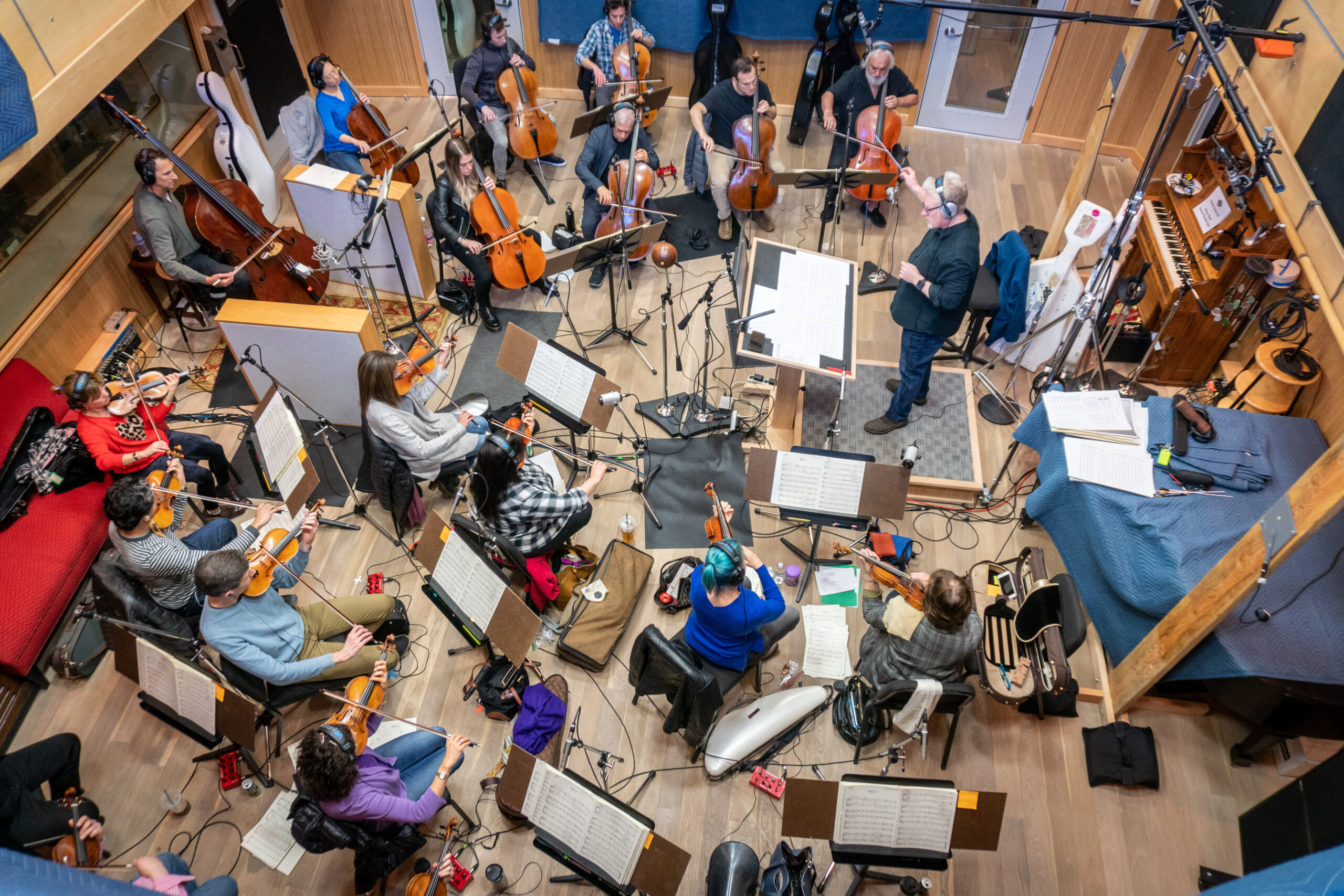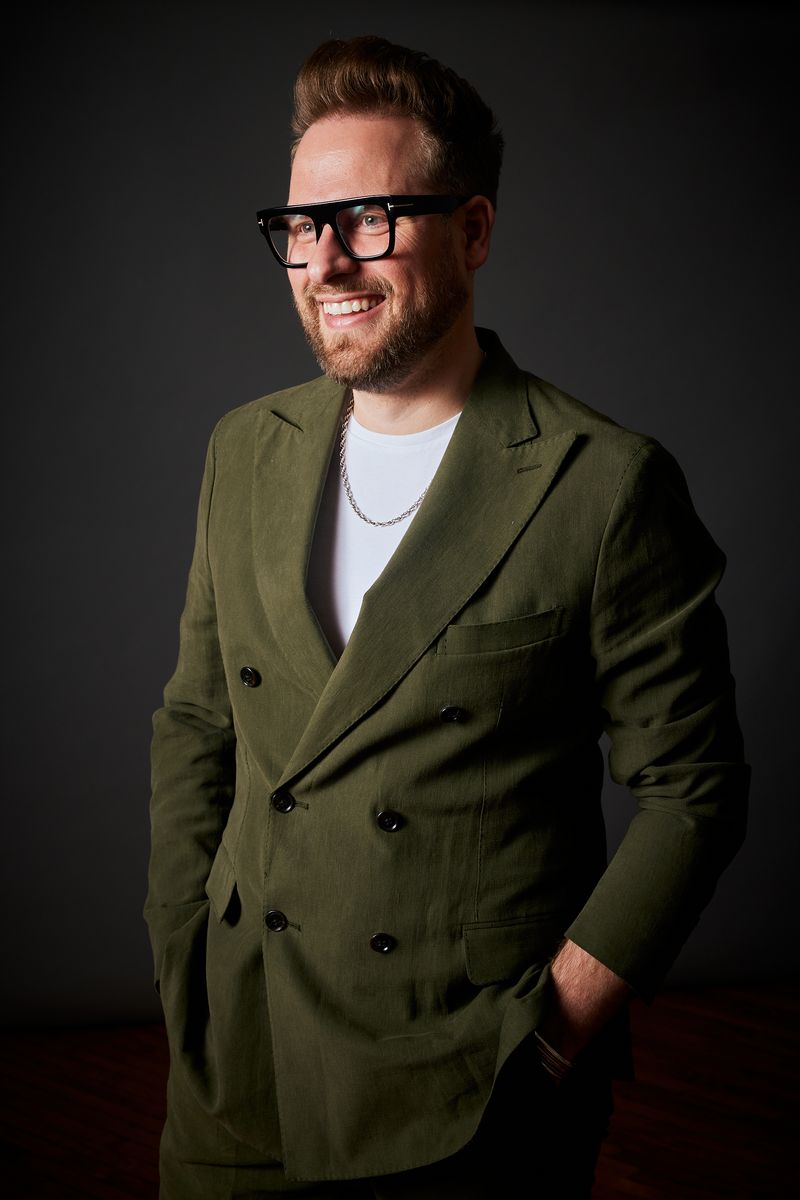When one thinks of Benjamin Franklin, as previously seen on screen and TV, a portly, eccentric inventor-cum-politician arrives in the mind’s eye, whether it be Howard Da Silva in “1776,” Charles Coburn in “John Paul Jones,” Orson Welles in both “Royal Affairs in Versailles” and “La Fayette” and Tom Wilkinson in the Emmy-winning miniseries “John Addams.” But leave it to that show’s history-minded creator Kirk Ellis to recast and re-imagine the somewhat nerdy character as silver fox Michael Douglas for the new Apple TV+ miniseries “Franklin.” An actor who legendarily embodies handsome virility, Douglas brings a whole new, wryly suave tune to the Founding Father and his Mission Impossible to France, where his natural charms hope to assure military and monetary support that will free his colony from the British his new admirers are less than fond of.
Like many Apple series that bring history to relevantly energetic musical life, “Franklin is propelled by a score that blends both accurate period stylism with an ear-catching infusion of modern rhythm and orchestration. And here, it’s more than electrifying and entertaining given the scoring of Jay Wadley. Rooted in New York City where he oversees the music and audio production company Found Objects alongside “Servant” and “Old” composer Trevor Gureckis, Wadley’s scores like “I’m Thinking of Ending Things,” “Swan Song,” “Tell Me Lies” and “Indignation” have a smart sense of innovation and melody that would certainly seem apropos for a bon vivant who invented the lightning rod, bifocals and his personal prize of the musical glass armonica (an instrument whose descendent was indispensable to Jack Nitzsche’s score to “One Flew Over the Cuckoo’s Nest”). But more pressingly here, Franklin is a diplomat and ladies’ man with one trick up his sleeve after the other to outsmart the English who’d happily see him dead.

Wadley’s Eureka! solution for “Franklin” is to create a captivating hybrid score, at once blending the classical music of the French salons and aristocracy he works his erudite Yankee charm on with the emotion of a father-son relationship he has with his young charge Temple (Noah Jupe) along with pulsating electronic espionage music and a grand symphonic sense of import. It’s scoring that drives this unique costume drama and its wonderfully unlikely star with a feeling of rhythmic relevance and bewigged character to make Benjamin Franklin come musically alive into a new, youthful public consciousness like never before, all without losing his place in America’s creation – and its most vital ally.

Tell us about your own musical beginnings.
Oh, man! It’s been a long road, but I started out playing piano singing in choir, playing in punk bands, and producing bands to writing for my choir. I had my first choir piece performed my senior year in high school, and it changed my life. From that point on I knew I was going to be a composer. Then I studied composition at Oklahoma City University with Ed Knight and then Yale School of Music with Martin Bresnick, Aaron Jay Kernis, Ezra Laderman and did workshops with David Lang, John Adams, John Corigliano and more. Then straight out of grad school I started working with Rufus Wainwright as an orchestrator and as an additional composer on the TV show “Tell Me Lies.” Those were my “day jobs” while pursuing my own career.
One of your first breakout films was the 1950’s college-set “Indignation.” Do you think you had a knack for intellectually driven characters at the start?
I do think that’s the type of work that I’m drawn to for sure. I think projects that challenge me at a philosophical level and directors who have a bit more of a cerebral approach to filmmaking.

How was the experience of working with Charlie Kaufman as a writer and director on “I’m Thinking of Ending Things?”
It was absolutely incredible and exactly as you would imagine. He’s such a brilliant director, an intellectual writer, and an uncompromising creative person. I’d long been a fan of his work, so collaborating with him was a dream come true. It was a fun intellectual exercise to get into the mind of the character and explore how the score itself was a reflection of his inner world and his fantasy of having lived an alternate life.

Some of your earlier series work was on “The OA” and “Vice” before you scored the revival of “Tales of the City.” What were those experiences like, and how did they differ from your film work?
They’re different and the same in many ways. Every project is unique. I’m lucky that I’ve worked with only wonderful people, so it’s always been fluid. With shows obviously you just have to put out a lot more music in a shorter amount of time by comparison to a film and you usually don’t have budgets or timelines that allow for a lot of recording… except for in the case of “Franklin,” of course.

How did “Franklin” come your way? And once you got the assignment, did you do your own history lesson with the subjects? If so, what were some of the most surprising things you learned about Benjamin Franklin, and did that influence your approach?
I heard about it through my agent and had sent in some reels to the supervisor who I had worked with before and he knew my skill set was a good match for the show. Had a great interview with Tim VanPatten, who was incredible to chat with and work with. Just one of the sweetest guys in the industry and with and extraordinary body of work behind him. I didn’t know much about this storyline at all, so really all the information in the show was new to me. I guess why it makes a good show!
What was it like working with writer and producer Kirk Ellis, who also wrote “Sons of Liberty” and won Emmys for “Into the West” and “John Addams?” And how does having someone who’s a real history buff help you out?
I didn’t get much interaction with Kirk but it’s such a gift when you know the work has been thoroughly researched and well-crafted into something that still speaks with a strong dramatic arch.

Talk about scoring the main titles. How did the idea of making it out of the era’s clever “cut out” stagecraft shape your approach?
The main titles really are a medley of our main themes coming together in this grand 90-second title. The cutout stagecraft was something that I played with by trying to incorporate some smaller hand-made sounds in the main title that didn’t really play in the rest of the score. It help connect the large scale of the setting, drama, and stakes with the representation in the handmade art.
Michael Douglas is certainly a different, non-nerdy Benjamin Franklin than what we’re used to. What do you think his star power brought to the role, and did his portrayal influence you?
I think his performance had a sense of heart to it that really communicated the sacrifice he made and the importance of Franklin’s involvement in the formation of our country. I tried to reflect that sense of pride and duty in Franklins main them.

Tell us about playing the wit that Franklin approaches most situations with?
It was always a delicate balance to not tip too much into cheesy comedy so for the most part I tried to be hands-off and let Michael’s performance speak but when it did need score I tended to lean into more period-sounding score.
How “French” or classical did you want to make the score given the show’s setting? What’s it like to write in that style and who were your influences?
It’s a challenge to write in that style convincingly, and this was no exception to that. I wanted the baroque and classical music to be the tie-in to the French aristocracy and opulence. The ornate nature of the clothing and interiors and architecture lent itself to leaning into that a bit in the score.

Do you think it was important here not to reign yourself into a historically accurate musical approach?
Yeah, with the onscreen music Michael Hill put a lot of effort in making sure all of that was historically accurate but with the score we felt we could reference it but take liberties with it to have it fit our narrative and vibe.
What kind of ensemble did you end up with?
A full orchestra believe it or not! 40 strings, 8 winds, 10 brass, percussion, Piano, Celeste, Harpsichord, Harp. Solo Violin and Cello. And then I also used a fair amount of organic sounding synth textures.
There’s some impressively rhythmic and suspenseful scoring in “Franklin” that would fit just as easily into a modern-day thriller project. In that way, how did you want to play the spy angle of the British who’d no doubt want Franklin dead?
Thanks! We felt like we needed to accentuate some of the danger he was in. It was not safe for him there and he was rather exposed. History could have very easily gone a different way, so the stakes were high!

How did you want to capture the weight of the American Revolution that’s going on back home, and the limited time that Franklin has to get the arms back to his comrades?
Most of that was through the lens of Franklin really. His concern and passion for the American dream. You get a little bit of it as well through Lafayette’s experiences and travel to America to fight.
Timothy Van Patten oversaw a number of episodes. He’s one of the great TV directors who usually deals in much harsher shows like “The Sopranos” and “Boardwalk Empire.” Did you have any interaction with him?
Yeah, he was my point on the show. He directed all the episodes and was the showrunner of the film, so we had weekly reviews and conversations on score. He’s the one who really pushed and drove that grittier approach to the story and the environment.
“Franklin” has an especially lush and well-recorded score. Where was it done, and were there any linger pandemic restrictions that affected it?
Thank you! We recorded in Nashville at Oceanway and thankfully, no, there were no more restrictions that slowed us down or made it a challenge. It was smooth sailing!

What do you think that being based in New York City as opposed to LA brings to your work?
I think there’s just a little bit of a different ethos to being a composer in NY vs LA. Both are valid, but I think a specific type of prestige work exists in NY that I am particularly drawn to. And there aren’t as many composers in NY working at the same level so there are some advantages… I assume?
When you look back at history-based shows like “John Addams,” what part do you think that “Franklin,” and your music for it has in opening up audiences’ interest in “the founding fathers,” and making them relevant to today?
I hope this show is a reminder of the principles on which this country was founded, and they show up to vote to preserve Democracy and decency in our coming elections.
Watch “Franklin” on Apple TV+ HERE and buy the score album on Apple Music HERE
Visit Jay Wadley’s website HERE
Special thanks to Sarah Roche at White Bear PR



Leave a Reply